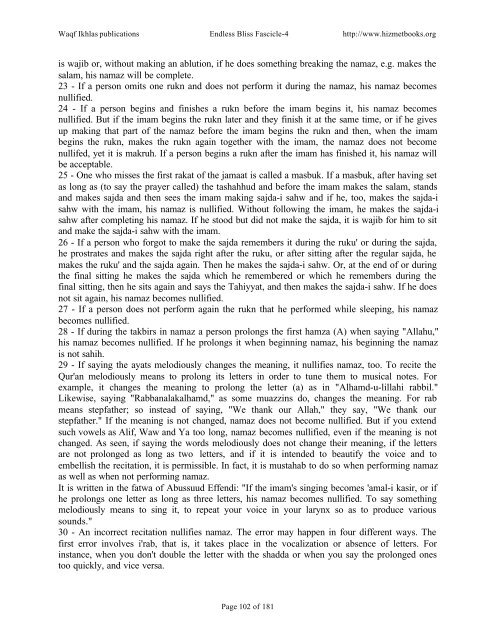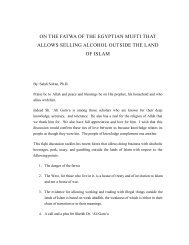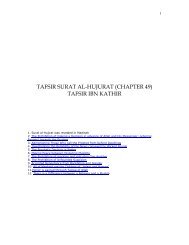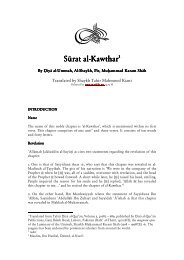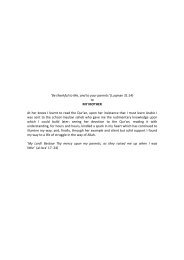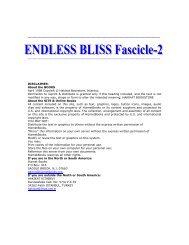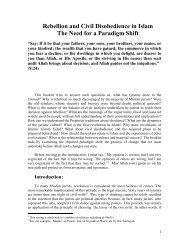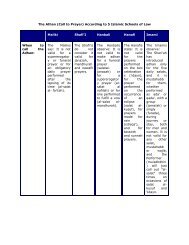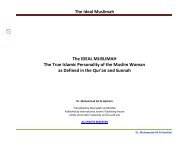ENDLESS BLISS FASCICLE-4
ENDLESS BLISS FASCICLE-4
ENDLESS BLISS FASCICLE-4
Create successful ePaper yourself
Turn your PDF publications into a flip-book with our unique Google optimized e-Paper software.
Waqf Ikhlas publications Endless Bliss Fascicle-4 http://www.hizmetbooks.org<br />
is wajib or, without making an ablution, if he does something breaking the namaz, e.g. makes the<br />
salam, his namaz will be complete.<br />
23 - If a person omits one rukn and does not perform it during the namaz, his namaz becomes<br />
nullified.<br />
24 - If a person begins and finishes a rukn before the imam begins it, his namaz becomes<br />
nullified. But if the imam begins the rukn later and they finish it at the same time, or if he gives<br />
up making that part of the namaz before the imam begins the rukn and then, when the imam<br />
begins the rukn, makes the rukn again together with the imam, the namaz does not become<br />
nullifed, yet it is makruh. If a person begins a rukn after the imam has finished it, his namaz will<br />
be acceptable.<br />
25 - One who misses the first rakat of the jamaat is called a masbuk. If a masbuk, after having set<br />
as long as (to say the prayer called) the tashahhud and before the imam makes the salam, stands<br />
and makes sajda and then sees the imam making sajda-i sahw and if he, too, makes the sajda-i<br />
sahw with the imam, his namaz is nullified. Without following the imam, he makes the sajda-i<br />
sahw after completing his namaz. If he stood but did not make the sajda, it is wajib for him to sit<br />
and make the sajda-i sahw with the imam.<br />
26 - If a person who forgot to make the sajda remembers it during the ruku' or during the sajda,<br />
he prostrates and makes the sajda right after the ruku, or after sitting after the regular sajda, he<br />
makes the ruku' and the sajda again. Then he makes the sajda-i sahw. Or, at the end of or during<br />
the final sitting he makes the sajda which he remembered or which he remembers during the<br />
final sitting, then he sits again and says the Tahiyyat, and then makes the sajda-i sahw. If he does<br />
not sit again, his namaz becomes nullified.<br />
27 - If a person does not perform again the rukn that he performed while sleeping, his namaz<br />
becomes nullified.<br />
28 - If during the takbirs in namaz a person prolongs the first hamza (A) when saying "Allahu,"<br />
his namaz becomes nullified. If he prolongs it when beginning namaz, his beginning the namaz<br />
is not sahih.<br />
29 - If saying the ayats melodiously changes the meaning, it nullifies namaz, too. To recite the<br />
Qur'an melodiously means to prolong its letters in order to tune them to musical notes. For<br />
example, it changes the meaning to prolong the letter (a) as in "Alhamd-u-lillahi rabbil."<br />
Likewise, saying "Rabbanalakalhamd," as some muazzins do, changes the meaning. For rab<br />
means stepfather; so instead of saying, "We thank our Allah," they say, "We thank our<br />
stepfather." If the meaning is not changed, namaz does not become nullified. But if you extend<br />
such vowels as Alif, Waw and Ya too long, namaz becomes nullified, even if the meaning is not<br />
changed. As seen, if saying the words melodiously does not change their meaning, if the letters<br />
are not prolonged as long as two letters, and if it is intended to beautify the voice and to<br />
embellish the recitation, it is permissible. In fact, it is mustahab to do so when performing namaz<br />
as well as when not performing namaz.<br />
It is written in the fatwa of Abussuud Effendi: "If the imam's singing becomes 'amal-i kasir, or if<br />
he prolongs one letter as long as three letters, his namaz becomes nullified. To say something<br />
melodiously means to sing it, to repeat your voice in your larynx so as to produce various<br />
sounds."<br />
30 - An incorrect recitation nullifies namaz. The error may happen in four different ways. The<br />
first error involves i'rab, that is, it takes place in the vocalization or absence of letters. For<br />
instance, when you don't double the letter with the shadda or when you say the prolonged ones<br />
too quickly, and vice versa.<br />
Page 102 of 181


